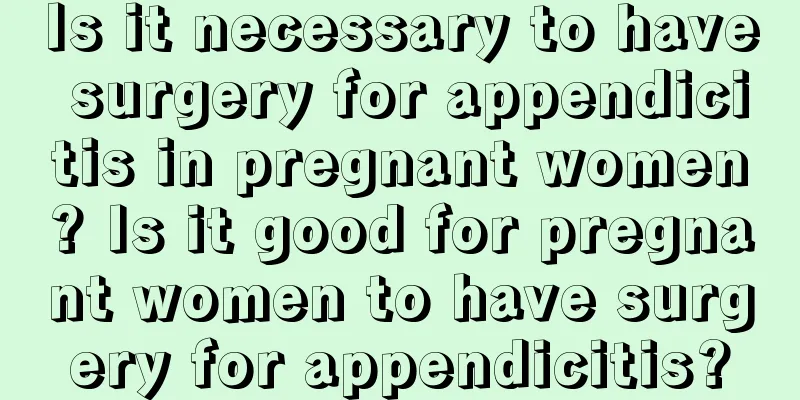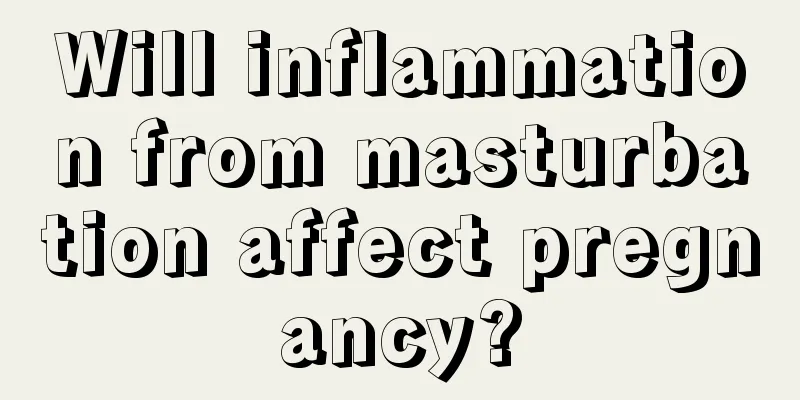Is it necessary to have surgery for appendicitis in pregnant women? Is it good for pregnant women to have surgery for appendicitis?

|
Appendicitis, also known as appendicitis, is a common disease in daily life and is mostly treated with surgery. However, many pregnant women suffer from appendicitis during pregnancy. Is it okay for them to undergo surgery to treat the appendicitis? In fact, appendicitis in pregnant women must be treated surgically, otherwise lesions may occur and affect the normal development of the fetus. According to statistics, if a pregnant woman develops appendicitis, there is only a 50% chance of confirming the diagnosis before surgery. However, obstetricians and gynecologists recommend that if acute appendicitis is suspected during pregnancy, it is best to undergo surgery to remove the appendix as soon as possible. If acute appendicitis is not treated with surgery early, once it is delayed until the appendix ruptures and causes acute peritonitis, it will cause sepsis in pregnant women, and both the mother and the fetus will be in danger of life. Pregnant women do not have to worry about the risks of surgery, because even a traditional appendectomy will not cause premature birth or injury to the fetus as long as it does not put excessive pressure on the uterus. Moreover, many hospitals now use laparoscopic surgery when performing appendectomy, which is a surgical method with small wounds, good vision, and faster recovery, and has less impact on the fetus and uterus. However, there are also reports that pregnant women who are more than 23 weeks pregnant have a relatively increased chance of premature birth within one week after undergoing appendectomy. Therefore, it is best for pregnant women to stay in the hospital to protect the fetus after undergoing appendectomy. Pregnant women who are more than 36 weeks pregnant and must have their appendix removed should be mentally prepared to become mothers early. Because when the fetus reaches this week, if there are signs of premature uterine contractions, most obstetricians and gynecologists will recommend that the fetus be born earlier to facilitate the care of the mother and fetus, as well as postpartum physical recovery. Pregnancy toxemia usually occurs after 20 weeks of pregnancy. Most cases are acute and will cause symptoms such as hypertension, edema, proteinuria, etc. The mother will have whole body spasms. It mainly affects older mothers, pregnant mothers with multiple births, and pregnant mothers with kidney and hypertension diseases. Although the incidence is not high, accounting for 7% of all parturients, it is a very dangerous and serious disease. Regular prenatal checkups are the only way to detect preeclampsia early. |
<<: What to do if you have pharyngitis during breastfeeding
>>: What to do if fetal heart rate monitoring is unqualified? Mothers must know
Recommend
Pregnancy belly suddenly hard
We all know that women will show various symptoms...
Is it okay to use tampons while swimming during menstruation?
For domestic women, tampons are a new type of inn...
Symptoms of pelvic flooring at 37 weeks of pregnancy
The growth cycle of the fetus is expressed differ...
What is the structure and design principle of a shower head? Tips for cleaning a clogged shower head
The structure of a shower is mainly divided into ...
Soy milk recipes for pregnant women and what to pay attention to
Many pregnant mothers around us often suffer from...
How to Make Your Breasts Smaller
Obesity is a phenomenon that people hate the most...
How to quickly stop itching below
Itching down there is also a common gynecological...
What does it mean to dream about doing hair?
In daily life, when most people go to a hair salo...
What are the precautions for surgical treatment of uterine prolapse?
The uterus is an important reproductive organ of ...
What to do if milk keeps leaking after weaning
It is common for breasts to leak milk during the ...
The ractopamine-laced pork you heard about is the pig that has taken diet pills.
This article was first published by Hunzhi (WeCha...
Will the discharge continue if the membranes rupture prematurely?
There are many reasons for placental abruption. M...
How to make breasts bigger and breast enhancement methods for girls in puberty
How girls in their puberty period can make their ...
No menstruation after miscarriage
Termination of pregnancy surgery is very harmful ...









